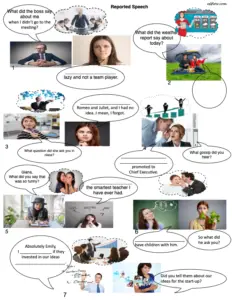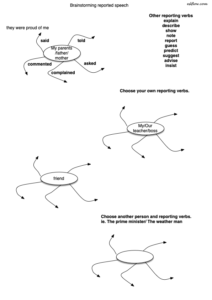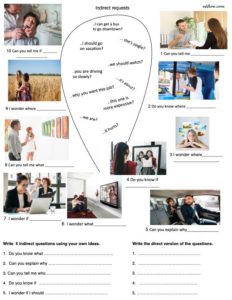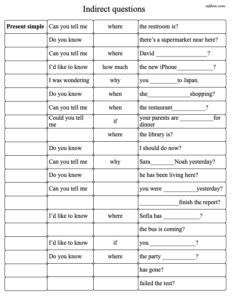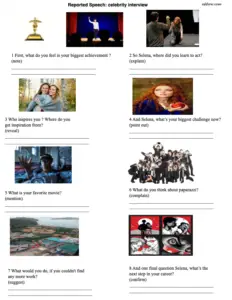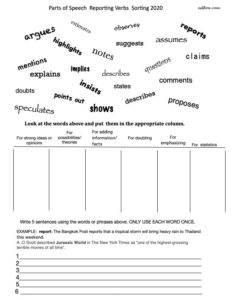Reported Speech and Indirect Requests Listening and Speaking Exercises
Indirect questions and reported speech are two aspects of English grammar that can be a little tricky. Practice with pictures and listening using multiple intelligences can help make lessons more entertaining and engaging.
1 Reported speech listening/speaking (with audio and answers)
Reported speech is an essential but sometimes overlooked aspect of English grammar. This is a fairly elementary exercise. Students can try to complete the speech bubbles. Then they can listen to the audio to compare answers.
Subscribe to Eslflow
Subscribe to get full access to the latest and best resources from eslflow.com. There are no ads in the newsletter and you will receive entertaining, high quality, and up-to-date teaching resources regularly. And, if you subscribe, you will be supporting the eslflow website.
Reported Speech Guide
| Variations | Direct Speech | Reported Speech |
|---|---|---|
| Present Simple | “I live in Paris.” | He said that he lived in Paris. |
| Present Continuous | “I am reading a book,” she said. | She said that she was reading a book. |
| Past Simple | “I went to the park,” John said. | John said that he had gone to the park. |
| Past Continuous | “I was playing soccer,” he said. | He said that he had been playing soccer. |
| Present Perfect | “I have seen that movie,” she said. | She said that she had seen that movie. |
| Past Perfect | “I had finished my homework,” he said. | He said that he had finished his homework. |
| Will | “I will call you later,” she said. | She said that she would call me later. |
| Can | “I can swim,” he said. | He said that he could swim. |
| Must | “You must leave now,” she said. | She said that I had to leave then. |
| Yes/No Questions | “Did you finish your homework?” he asked. | He asked if I had finished my homework. |
| Imperatives | “Close the door,” he said. | He told me to close the door. |
Introduction to reported speech practice worksheet (PDF)
2 Reported speech brainstorm (with audio and possible answers)
Two introductory exercises for reported speech.
Reported speech brainstorm (PDF)
Indirect questions
| Variations | Direct Question | Indirect Question |
|---|---|---|
| Present Simple (to do) | What do you do for a living? | I’d like to know what you do for a living. |
| Present Simple (to be) | Who is your best friend? | Can you tell me who your best friend is? |
| Present Continuous | What are you doing right now? | I was wondering what you are doing right now. |
| Past Simple (to do) | What did you do last weekend? | Could you let me know what you did last weekend? |
| Past Simple (to be) | Who was your teacher last year? | I’d be interested to know who your teacher was last year. |
| Present Perfect | What have you done today? | I’m curious to know what you have done today. |
| Yes/No Questions (to do) | Do you like reading? | Can you tell me if you like reading? |
| Yes/No Questions (to be) | Are you okay? | Could you tell me if you are okay? |
| Will | Will it rain tomorrow? | Do you know if it will rain tomorrow? |
Introduction indirect questions practice (PDF)
3 Indirect questions (with answers and audio)
This is an indirect questions listening and speaking exercise and activity. Students try to complete the invitations conversations using the pictures and the vocabulary. Or students can listen to the audio and match the vocabulary and phrases to complete the questions.
Indirect questions listening/speaking (PDF)
(Indirect questions Youtube video mp4)
4 Indirect questions challenge(with audio and answers)
An exercise to introduce or review indirect questions.
Indirect questions challenge (PDF)
5 Celebrity interview: advanced reported speech with academic reporting verbs (with audio and answers)
This is a more advanced reported speech exercise for listening/speaking or writing students. I’ve noticed that even quite good students often have trouble using a variety of reporting verbs. In this exercise, students listen to a interview with a celebrity and write sentences using the specified reporting verbs.
Celebrity interview: reported speech (PDF)
Related Resources:
5 Gerunds and Infinitives Exercises
Comparative adjective exercises
10 Adjectives Exercises Including Adjectives for People and Things
7 Picture-Based Present Continuous Worksheets (PDF)
8 Preposition Exercises for Location, Time and Movement (PDF)
5 Future Tense Vocabulary and Speaking Exercises
5 Useful Passive Voice Practice worksheets
6 Present Perfect Language and Speaking Worksheets
11 Incredibly Useful Past Tense Simple Teaching Activities (PDF)
Listening/Speaking Exercises for Conditionals
6 Reporting verbs (sorting)
This is an exercise for academic writing, or any kind of advanced writing. I’ve noticed over years that students just didn’t get “reporting verbs”. They had a lot of trouble introducing paraphrasing and quotations. I have never got around to doing anything about it before. But I’m pretty proud of this exercise. It makes a nice writing lesson to go along with essay writing activities that require doing some research. Bringing the research into an essay requires paraphrasing and quotations. Reporting verbs are often quite flexible and difficult to explain but this activity helps generate discussion and a better understanding of their various uses.
Related Resources:
10 opinion and argument writing worksheets
8 comparison/contrast templates and exercises
10 cause/effect writing activities
3 kinds of exercises for teaching transitions
6 memorable narrative essay writing practice exercises (PDF)
6 delightful descriptive paragraph and essay writing exercises (PDF)
11 essential exercises for elementary writing students (PDF)
